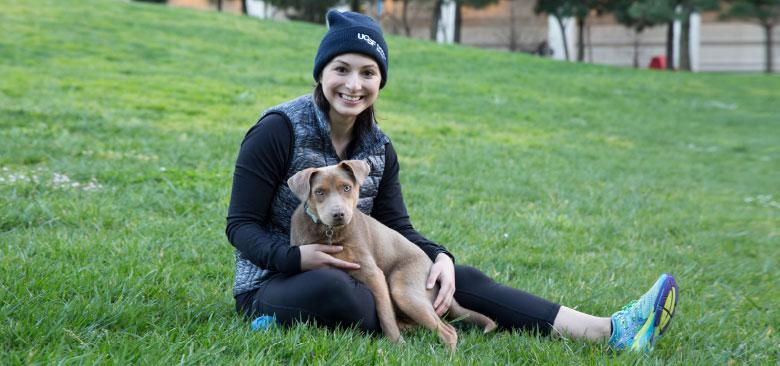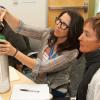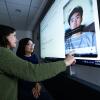
Victoria Flores with her dog, Dallas (photo and video by Elisabeth Fall)
Learning to Write in Graduate School
I hated squirrels as a child – not because I dislike furry woodland animals, but because the word itself was the bane of my existence. Because of a speech disability – childhood apraxia of speech, a motor speech disorder in which children have trouble saying sounds, syllables and words – I spent all of my elementary school years, including summers, in a special education program, and “squirrel” was the word that always tripped me up. Every time that flash card appeared, I’d hope against hope to get it right, and each time, “skwaarr” was the word that would emerge.
It took “only” four and a half years for my classmates to stop making fun of the way I spoke, but I still had trouble when I had to read something new out loud and, so, remained quiet; I mostly kept to myself. In school, I turned toward math and science, the perfect place to be quiet and awkward – and I excelled. Once I entered middle school, I was quickly placed in accelerated math courses.
It didn’t make me much more confident, though. That occurred outside of school, where I was a competitive figure skater and where I met a coach – loud and flamboyant – who was everything I was not. Under her guidance, I not only became a better skater, but also began to believe in myself and learned to channel my strengths. In particular, I discovered I could be a powerful speaker, and this was a major factor in getting me through my undergraduate studies. If given the option to make a presentation instead of writing a paper, I always chose the presentation. However, after entering graduate school at UCSF, I could no longer avoid the inevitable: I had to learn to write.
The problem was that despite finally making it to graduate school, those childhood hardships found a way to hold me back. I spent the first quarter of my master’s program frustrated and angry. The limitations of my past hadn’t allowed me to develop the full set of English language skills that I needed.
So I sought help.
I found it at UCSF’s Learning Resource Services (LRS), which helps students pursue academic excellence through a variety of services – including help understanding how to edit one’s own writing. I met with a learning specialist who showed me first how to read my writing aloud while listening to determine where the problems are and, then, how to address those problems. Today, I always read my papers out loud slowly, even using a second sheet to ensure I am reading a single line at a time, which prevents my eyes from skipping ahead. The more I do this, the better I get at identifying errors, which allows me to improve the organization, flow and understandability of my written work.
I still struggle with my writing, of course, but I now have a set of tools to help me progress. I feel more confident in my capabilities as a writer and have seen the improvement throughout my time as a graduate student. I am now pursuing my PhD degree, and writing well is something I simply have to learn to do. I’m grateful that I now have strategies that will make my writing stronger and help me tackle the many academic challenges that are sure to come my way.
Maybe more importantly, I’ve learned that my childhood disability may have had a role in shaping who I am today, but it does not define me – nor does it define the nurse researcher I will one day become.
Victoria Flores is a doctoral student at UC San Francisco School of Nursing.
Each year, UCSF School of Nursing is ranked among the top graduate schools in the nation. Please visit our website for more information about our Adult-Gerontology Primary Care Nurse Practitioner program and our Occupational and Environmental Health Nursing program – or to follow the videos of Victoria’s nursing journey.



